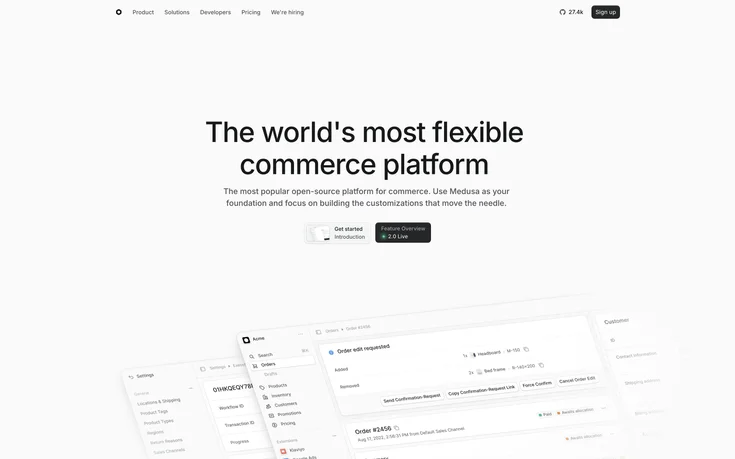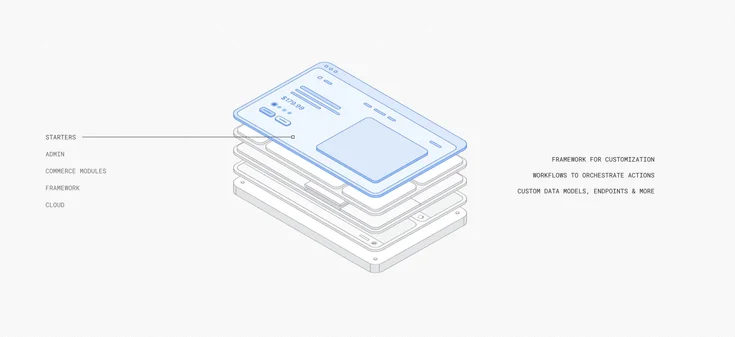Exploring MedusaJS Multi Vendor Capabilities

Content:
- Understanding Multi Vendor Marketplace
- Why Choose MedusaJS for Your Marketplace?
- Setting Up Your Development Environment
- Creating a Basic MedusaJS Project with Data Models
- Creating a Multi-Vendor Module
- Configuring Multi-Vendor Functionality in MedusaJS
- Vendor Administration and API Routes
- Managing Vendors with the MedusaJS Admin Panel
- Managing Vendor Orders and Products
- Customizing Your Marketplace for a Unique Experience
- Security and Performance Best Practices
- Filtering and Customizing Entities
- Scaling Your MedusaJS Marketplace
- Integrating Third-Party Services, Plugins, and API Routes
- Final Thoughts on MedusaJS for Multi-Vendor Platforms
In the realm of e-commerce, multi-vendor marketplaces are gaining traction. They offer a platform where multiple sellers can offer their products or services. MedusaJS allows you to customize Medusa to fit specific marketplace needs.
But how do you build such a platform?
Enter MedusaJS, a JavaScript framework designed for creating robust online marketplaces. It’s a powerful tool that can help you set up a multi-vendor platform with ease.
In this article, we’ll delve into the multi-vendor capabilities of MedusaJS. We’ll guide you through the process of setting up a JavaScript marketplace using this innovative framework.
Whether you’re a JavaScript developer, an e-commerce platform developer, or a tech-savvy entrepreneur, this guide will provide valuable insights.
So, let’s embark on this journey to explore the potential of MedusaJS for multi-vendor marketplaces.
Understanding Multi Vendor Marketplace
A multi-vendor marketplace is a digital platform where numerous sellers offer their goods or services. This model allows customers to explore a wide variety of products in a single place.
It maximizes choice and convenience for buyers while creating opportunities for sellers. These marketplaces drive competition and innovation, making them an appealing business model.
For those venturing into e-commerce, building a multi-vendor marketplace is a strategic move. It diversifies offerings and attracts a broad audience. With tools like MedusaJS, creating such a platform becomes achievable, efficient, and scalable. This opens doors to new possibilities and growth in the online marketplace sector by providing essential features like vendor management and seamless checkout processes, ensuring a flexible and successful multivendor marketplace.
Why Choose MedusaJS for Your Marketplace?

MedusaJS is a powerful tool for building online marketplaces. It offers a robust platform with versatility and flexibility. Its architecture supports dynamic and scalable solutions.
Here are some reasons to choose MedusaJS for your marketplace:
- Open-source and community-driven.
- Supports extensive customizations.
- Seamless integration with popular tools.
- Scalable for business growth.
- Easy to manage multi-vendor setups.
- Availability of new API routes for exploring and testing new features.
MedusaJS’s community is another attractive aspect. It provides rich resources and support, helping you overcome development hurdles. This makes MedusaJS a compelling choice for creating a vibrant, multi-vendor marketplace.
Setting Up Your Development Environment
Preparing your development environment is a crucial step. To begin, ensure you have Node.js installed. MedusaJS relies on it for running its core processes.
You will also need a database like PostgreSQL to store data. Setting these up allows you to smoothly deploy your MedusaJS project. Proper setup is key to efficient development and testing.
Creating a Basic MedusaJS Project with Data Models
Starting a basic MedusaJS project is straightforward. First, open your terminal and initialize your project. Use the command npx create-medusa-app my-store.
This command sets up your project with the necessary structure. It includes fundamental files and configurations. The provided template helps ensure a smooth start.
Once the setup is complete, navigate to your project directory. From here, you can run npm install to install dependencies. This step ensures your MedusaJS project has all the needed modules.
After installation, you can begin exploring MedusaJS. Use the command npm run develop to start your server. This opens up the basic project environment for further development.
When defining the Vendor data model, you can use const store to represent the store data model. This helps in managing store-specific data operations, such as linking products and orders to the respective stores.
Creating a Multi-Vendor Module
Creating a multi-vendor module is a crucial step in building a multi-vendor marketplace. This module will house the data models for vendors and admins, enabling efficient management of these entities. To get started, create a new directory within the src/modules directory, for example, src/modules/multi-vendor. Inside this directory, create a models directory to store the data models for vendors and admins.
Begin by defining the Vendor data model. Create a vendor.ts file in the models directory. This file will represent a business that sells products in the marketplace. Define essential properties and methods for the Vendor data model, such as id, name, email, and products.
Next, create a vendor-admin.ts file in the models directory to define the VendorAdmin data model. This model represents an admin of a vendor, with properties and methods like id, vendorId, email, and password.
To handle the business logic for managing vendors and admins, create a service.ts file in the src/modules/multi-vendor directory. This service will be the core of your multi-vendor module, managing operations and interactions between vendors and admins.
Finally, create an index.ts file in the src/modules/multi-vendor directory to define the module’s structure. This file will export the module’s data models and service, making them accessible throughout your MedusaJS project.
By organizing your multi-vendor module in this manner, you ensure a structured and scalable approach to managing vendors and admins in your marketplace.
Configuring Multi-Vendor Functionality in MedusaJS
To enable multi-vendor capabilities in your MedusaJS project, you’ll need to make specific configurations. Start by accessing your project’s admin panel. Here, you can define and manage vendor roles.
Next, configure product listings to support multiple vendors. Ensure that the system allows vendors to add their products. Set permissions so they can manage their listings autonomously. The system ensures that only items associated with the current user's store are retrieved, tailoring the experience to the individual's store management needs.
Key steps for configuration include:
- Setting up vendor-specific permissions.
- Designing a vendor dashboard for ease of access.
- Configuring product categories to handle diverse vendor offerings.
The admin panel in MedusaJS provides essential tools. These tools help manage vendor operations efficiently. With these configurations, your marketplace becomes a true multi-vendor platform.
Vendor Administration and API Routes
Vendor administration is a critical aspect of a multi-vendor marketplace. To effectively manage vendors and admins, you need to create API routes that handle CRUD (Create, Read, Update, Delete) operations. Start by creating a vendors directory within the src/api directory to store the API routes for vendors.
First, create a route.ts file in the src/api/vendors directory to define the API route for creating a new vendor. This route will handle the creation process and return the newly created vendor.
Next, create another route.ts file in the same directory to define the API route for retrieving a vendor’s details. This route will fetch and return the details of a specific vendor.
For updating a vendor’s details, create a route.ts file that handles the update process and returns the updated vendor information.
Lastly, create a route.ts file to define the API route for deleting a vendor. This route will manage the deletion process and return a success message upon completion.
By setting up these API routes, you enable seamless management of vendors within your multi-vendor marketplace, ensuring that all CRUD operations are efficiently handled.
Managing Vendors with the MedusaJS Admin Panel

The MedusaJS admin panel is crucial for vendor management. It enables you to oversee vendor activities seamlessly. You can approve new vendors and monitor their sales efficiently. Ensuring operations are performed within the scope of an authenticated user is essential for maintaining secure and reliable management.
Within the panel, organize vendors into categories. This helps in managing large inventories. MedusaJS allows you to implement custom rules, ensuring smooth operations. This functionality assures vendors and marketplace administrators a streamlined experience.
Managing Vendor Orders and Products
Managing vendor orders and products is essential for the smooth operation of a multi-vendor marketplace. To facilitate this, create API routes that handle CRUD operations for both orders and products. Start by creating an orders directory within the src/api directory to store the API routes for orders.
First, create a route.ts file in the src/api/orders directory to define the API route for creating a new order. This route will handle the order creation process and return the newly created order.
Next, create a route.ts file to define the API route for retrieving an order’s details. This route will fetch and return the details of a specific order.
For updating an order’s details, create a route.ts file that handles the update process and returns the updated order information.
Lastly, create a route.ts file to define the API route for deleting an order. This route will manage the deletion process and return a success message upon completion.
Similarly, create a products directory within the src/api directory to store the API routes for products. Follow the same process to create routes for creating, retrieving, updating, and deleting products.
By establishing these API routes, you ensure that your multi-vendor marketplace can efficiently manage orders and products, maintaining smooth operations and a positive user experience.
Customizing Your Marketplace for a Unique Experience
Customizing your marketplace is essential to stand out. MedusaJS provides extensive flexibility in design. Tailor the user interface to align with your brand identity.
Beyond aesthetics, customization influences user experience. MedusaJS allows you to modify workflows. To create relationships between different data models within isolated modules, you can utilize a 'module link'. This ensures that the shopping journey is smooth and intuitive.
Customization also extends to vendor interactions. You can create specific dashboards tailored for different vendor needs. This personalization enhances their experience and boosts satisfaction.
Security and Performance Best Practices
Security is crucial for any multi-vendor marketplace. MedusaJS equips you with robust security features. Implement them to protect user data and transactions. Additionally, use 'sync links' to manage database migrations and maintain relationships between data models.
Performance optimization is equally vital. Ensure your marketplace loads quickly and operates seamlessly. Follow these best practices:
- Regularly update your MedusaJS dependencies.
- Use caching techniques to reduce load times.
- Optimize images and other media files.
By adhering to these guidelines, you ensure a secure and fast experience for all users. This boosts trust and user engagement.
Filtering and Customizing Entities
Filtering and customizing entities is vital for enhancing the functionality and user experience of a multi-vendor marketplace. To implement this, create a filters directory within the src/api directory. Inside this directory, create a route.ts file to define the API route for filtering entities.
Start by creating a route.ts file in the src/api/filters directory to define the API route for filtering vendors. This route will handle the filtering process based on provided criteria and return the filtered vendors.
Next, create a route.ts file to define the API route for filtering products. This route will manage the filtering of products based on specific criteria and return the filtered products.
For filtering orders, create a route.ts file that handles the filtering process and returns the filtered orders.
Additionally, create a customizers directory within the src/api directory. Inside this directory, create a route.ts file to define the API route for customizing entities.
Start by creating a route.ts file in the src/api/customizers directory to define the API route for customizing vendors. This route will handle the customization process based on provided criteria and return the customized vendors.
Next, create a route.ts file to define the API route for customizing products. This route will manage the customization of products based on specific criteria and return the customized products.
For customizing orders, create a route.ts file that handles the customization process and returns the customized orders.
By implementing these API routes, you enable advanced filtering and customization capabilities in your multi-vendor marketplace, enhancing its functionality and user experience.
Scaling Your MedusaJS Marketplace
Scalability is key for growing marketplaces. MedusaJS supports horizontal scaling, allowing your platform to handle more vendors and customers. This ensures your marketplace can expand with demand.
As your user base grows, anticipate potential bottlenecks. Plan ahead by monitoring performance and resource usage, including managing user entities to ensure scalability. MedusaJS’s flexibility helps you adjust swiftly, maintaining a seamless experience for all users. This adaptability is essential for a successful, sustainable marketplace.
Integrating Third-Party Services, Plugins, and API Routes
Integrating third-party services can significantly enhance your marketplace’s functionality. MedusaJS provides robust API support, making it easy to connect various tools. This enables seamless integration with payment gateways, shipping providers, and more.
Moreover, the plugin ecosystem in MedusaJS offers numerous enhancements. You can leverage these plugins to extend your platform’s capabilities without major changes. By utilizing the module's data models, you can link different entities while maintaining their isolation. This modularity ensures your marketplace remains adaptable and cutting-edge, meeting evolving business and user needs.
Final Thoughts on MedusaJS for Multi-Vendor Platforms
MedusaJS stands out as an excellent choice for building dynamic multi-vendor marketplaces. Its flexibility, scalability, and strong integration capabilities cater to diverse business needs. MedusaJS enables users to create their own store within a multi-vendor marketplace, allowing for personalized ecommerce experiences. By choosing MedusaJS, you ensure a solid foundation for your e-commerce platform, poised for growth and technological advancements.